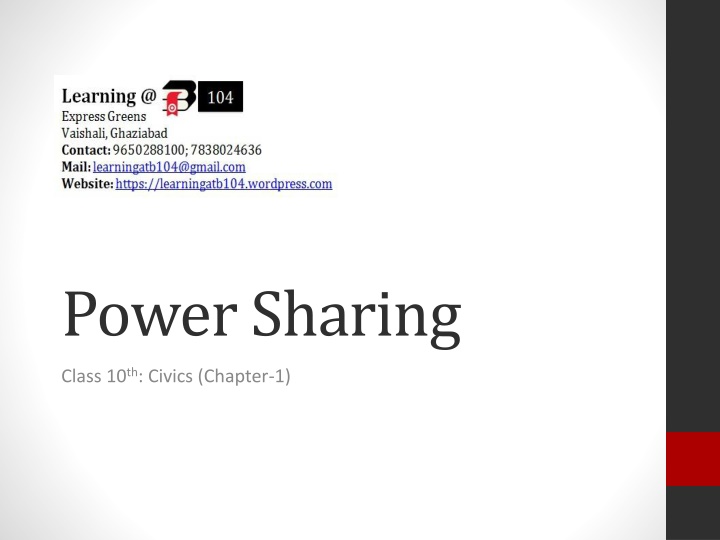Power Sharing in Belgium and Sri Lanka: A Comparative Study
Power sharing is crucial for peaceful governance, as seen in Belgium and Sri Lanka. While Belgium adopted accommodative measures with equal representation for Dutch and French-speaking communities, Sri Lanka faced majoritarian measures leading to ethnic tensions. The struggle for power in Sri Lanka by Tamil minority groups highlights the importance of inclusivity and equitable representation in governance.
Download Presentation

Please find below an Image/Link to download the presentation.
The content on the website is provided AS IS for your information and personal use only. It may not be sold, licensed, or shared on other websites without obtaining consent from the author.If you encounter any issues during the download, it is possible that the publisher has removed the file from their server.
You are allowed to download the files provided on this website for personal or commercial use, subject to the condition that they are used lawfully. All files are the property of their respective owners.
The content on the website is provided AS IS for your information and personal use only. It may not be sold, licensed, or shared on other websites without obtaining consent from the author.
E N D
Presentation Transcript
Power Sharing Class 10th: Civics (Chapter-1)
Definition Sharing or division of power between various political parties and various sections of society CASE STUDIES Belgium and Sri Lanka
Communities and Regions of Belgium Brussels Capital city 80% French speaking 20% Dutch speaking 59% population - Dutch speaking 40% French speaking
Belgium Case of Power Sharing: Accommodative Measures Equal number of Ministers representing both Groups in the Central Government Some special law requires the support of majority of members from each linguistic groups. Thus no, single community can make decisions unilaterally Equal representation in Brussels Brussels has a separate Government with equal representation from both the communities More power to the State Government The State Government is not a subordinate to the Central Government Community Government Third kind of Government elected by the people belonging to one language community Dutch, French and German speaking irrespective of their place of living. This Government has powers related with cultural, educational and language related issues
Ethnic Communities in Sri Lanka Ethnic Communities in Sri Lanka Sinhala speaking (74%) Tamil speaking (18%) Others (8%) Hindus and Muslims Buddhist Indian Tamils (5%) Srilankan Tamils (13%)
Sri Lankan Case of Power Sharing: Majoritarian Measures Majoritarian measures established Sinhala supremacy. As a result, the relation between Sinhala and Tamil got strained over time Language: In 1956, an Act was passed to recognize Sinhala as only official language, thereby Tamil was disregarded Education and Jobs: The Government followed policies that favored Sinhala applications for University positions and Government jobs Religion: Many people believed in Buddhism. A new constitution stipulated that state shall protect and foster Buddhism
Struggle for Power: Sri Lankan Tamils Sri Lankan Tamils launched parties and struggles for: Recognition of Tamil as an official language Regional autonomy Equality of opportunity in securing education and jobs When their demands were denied: By 1980s, several political organizations were formed demanding the independent Tamil Eelum (state) in north-east Sri Lanka Civil War started
Struggle for Power: Sri Lankan Tamils Contd Sri Lankan Civil War continued for over 25 years and caused significant hardships for the population, environment and the economy of the country As a result, thousands of people of both the communities were killed Many families were forced to leave the country as refugees and many more lost their livelihood
Highlights of Case Studies: Belgium & Sri Lanka Similarities: Both are democracies Differences: Power sharing arrangement is different Belgium s Uniqueness: Leaders have realized that unity of the country is possible only by respecting the feelings and interests of different communities and regions Sri Lanka s drawback: Sinhalese refusal to share power with Tamils led to the disunity through the emergence of civil war in the country
Reasons for Power Sharing Why Power Sharing is desirable Prudential Reason (common sense reasons) Moral Reason (good reasons) Helps in reducing the possibility of conflicts between the social groups In the very spirit of Democracy (people have right to be consulted on how they want to be governed) Political Stability
Forms of Power Sharing Among the different organs of the Govt. Forms of Power Sharing Among Political Parties, Pressure Groups and Movements Among different levels of the Govt. Among different Social groups
1. Among the different Organs of the Government System of checks and balances
2. Among different levels of the Government Federal division of power
3. Among different Social Groups Religious Groups
4. Among Political Parties, Pressure Groups and Movements Power sharing among Political Parties Pressure Groups Movements E.g. Doctors Union, IAS Association, Students Union E.g. Narmada Bachao Andolan, Quit India Movement E.g. Coalition Government
Any Queries/ Doubts?? THANK YOU !!























